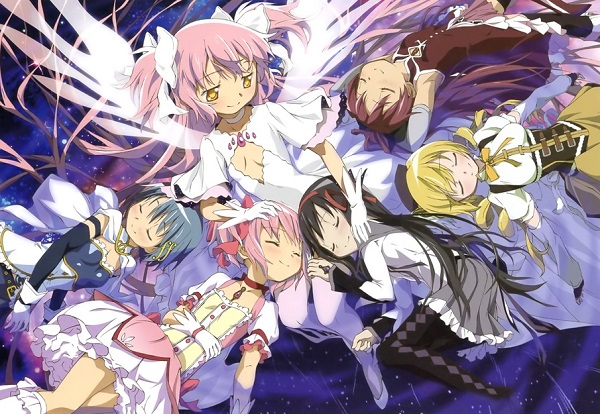
Having Japanese literature as one of my major fields of study in college, there’s a trope I discovered during my studies that’s always fascinated me. Actually, reading a lot of Japanese literature made me aware of it, but anime and manga is where I see tons of examples of it. It’s when an anime has a character that is some kind of immortal being, whether a god, a devil, an angel, etc., but they’re presented as more or less…human.
Despite having the status of “god,” “demon,” or whatever, these characters are given human traits, usually a human form and a wide range of human emotions. The “god” or “demon” could be lazy, jealous, embarrassed, mischievous, lovestruck, or any other emotion Western culture usually reserves for mortals only. To further illustrate, I listed a bunch of anime I’ve seen that have at least one character like this – a character who is some kind of omnipotent being, or at least called a “god” or something like that, yet they’re presented as very human, having human form and/or acting like a human rather than strictly a deity.
– Blood Lad: Inhabitants of the demon world like Staz are all quite human-like
– The World God Only Knows: “Demons from Hell” like Elsie and Haqua are actually very nice girls (and now we have goddesses in this current season)
– Death Note: Gods of death (shinigami) like apples (Ryuk) and fall in love with humans (Gelus and Rem)
– Hataraku Maou-sama!: The dark lord Satan is a part-timer!
– Evangelion: Shinji and Eva 01 becoming a god (or how you interpret the series)
– Kannagi: Nagi
– Shakugan no Shana: Many characters
– Haruhi: My favorite anime god XD
– Mirai Niki: Deus…and Yuno later on
– Inuyasha: Many characters
– Slayers: Many characters
– Spice and Wolf: Horo
– Soul Eater: Does Shinigami-sama count?
– The shonen trio: I know Naruto, Bleach, and One Piece have all had at least one character like this
– Madoka Magica: Madoka at the end of course
And those are just series off the top of my head. I’m sure I could think of more examples and you can probably think of more too (feel free to share any you want in the comments). There are several possible reasons for why anime is so filled with characters like this. Some of it may have to do with what I talked about in a post from a few years ago, “Animism and ‘non-human’ characters in anime.” The post was more specifically about how non-human characters in anime have human traits, not gods and demons in particular, but characters who are fantastical or alien beings, or non-living things like robots and swords. But some of what I said there is relevant here, specifically that it has to do with Japan’s historical religion, Shintoism. According to Shinto beliefs, there are various gods and spirits in all of nature and they live together with humans on Earth rather than in an immortal world like Heaven or Hell. Even though modern Japan as a whole is not a very religious country, it’s still very tradition-oriented and Shintoism still pervades everyday Japanese ideologies. Unlike the mono-theology of Western countries, Japan’s poly-theological history of worshiping gods that live on Earth with humans probably makes it very commonplace to depict characters called “gods” in their stories as being human-like or even fundamentally human.
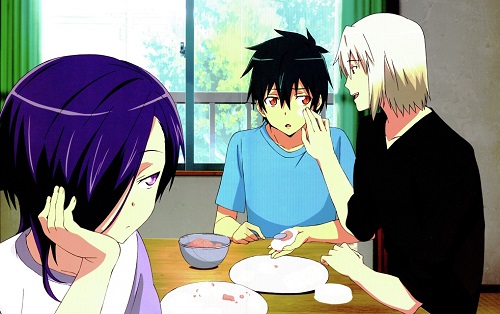
It’s actually not too dissimilar from how the ancient Greeks viewed their gods. I was briefly into Greek mythology back in middle school, and thinking back on that now, they also portrayed their gods as having a lot of human traits. Even though the gods lived outside the mortal world (Mount Olympus) they were constantly falling in love with mortal humans (Zeus in particular couldn’t keep it in his pants) or even being jealous of them. I’m sure we can all think of at least one anime where a god or goddesses falls in love with a human.
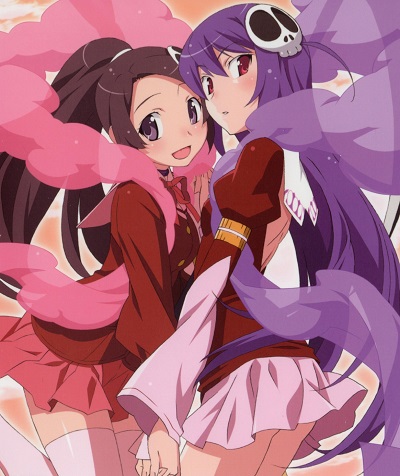
Another reason for why we see gods and demons portrayed like this in anime is simply that it’s appealing from a storytelling perspective. Since anime covers such a wide range of stories, having even god-like characters possess human traits makes them easier to portray as actual characters that fans can get attached to. They have their “human-side” that people can relate to and sympathize with, not just in how they look (like cute and/or attractive humans) and how they act (human emotions and personalities) but also their “god-like” side that makes them unpredictable and interesting, since it’s something the series author can get very creative with. This duality of having a human-side as well as an otherworldly god side is what makes these kinds of characters memorable.
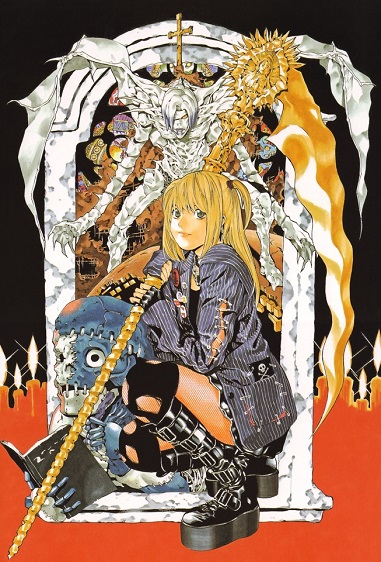
There’s one particular quote I recall reading in college that fits with this topic and has stuck with me since. I don’t remember the exact quote or where it came from (probably from one of the Japanese lit books I read, Silence by Shuusaku Endou) but it goes something like this: “The Japanese can’t imagine a god existing beyond the world of humans.” I believe the context of the quote was referring to why Christianity never caught on in Japan, but as far as this topic goes, it does shed some light on why so many anime/manga stories are quick to give characters called “god,” “demon,” or even “Satan” himself (Hataraku Maou-sama!) human emotions and behaviors. One could also say that the general Japanese populace’s ignorance about Western religion could be part of it too, but I think Japan’s history of Shintoism is the main root – there are all kinds of gods and they exist everywhere in the world with humans, so it’s not outrageous to think of them as having human personalities and feelings. But whatever the reason for it, having god and demon characters in anime make for fascinating fictional settings and fantastical storylines. It’s one trope I don’t see myself getting tired of ;)
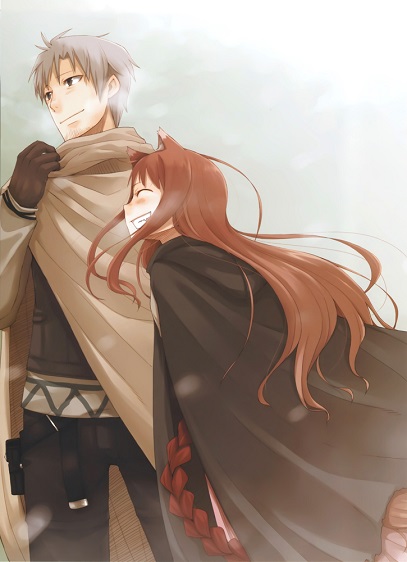
Interesting article. Yeah, it doesn’t get old or tiring.
Thanks, glad you liked it =)
I haven’t watched Madoka and you kind of spoiled it for me in this post, so warn people about that sort of stuff next time. ;-;
Good points nonetheless though
Erif, I’ve watched all but the last two episodes of Madoka, though it gives something away it wont spoil the series for you, I promise :D
Its worth watching when you get chance ;)
Sorry about that…but if you’ve read my blog before, you’ll know that I don’t refrain from using spoilers, whether on review posts or editorial posts. Though I’m surprised you haven’t been spoiled about Madoka until now, since it has been one of the most talked about anime of the last two years.
A key point here, I believe, is that many of Japan’s gods WERE human. Unlike Greece, where gods were almost exactly like humans except with superpowers, or Medieval Europe, where the king ruled his country by God’s choice and with his blessing, there was nothing “like” or “indirect” about a Japanese emperor’s claim to godhood during Japan’s early times and later on during the pre-war despotic period. That means that little more than 60 years ago, most of the country’s population believed there was a god among man leading the country. With such a short time span, there are obviously still people with clear memories of the period – one of my Japanese friends told me the story of how her grandfather cried when the emperor was forced to announce via radio that he was not in fact a god after the lost war.
You might have also met with the Shinto term “arahitogami” (現人神) – as you can guess from the kanji, it is used to describe those who are currently alive and perfectly human, and yet also possess a form of godhood. You can still hear the news claim that a god dwells in the body (or particular body parts, even :P) of exceptionally skilled athletes and the like.
I don’t think you’re into Touhou, but I consider Kochiya Sanae from that universe one of the most fascinating arahitogami characters out there. She basically went from normal girl –> miko –> miracle maker –> arahitogami and is expected to become a god fully when she dies as a human, and ironically, it was all because people found it easier to believe in the superstition that the girl living in the neighborhood has supernatural powers rather than believe that actual gods exist.
With characters like Madoka, you’re opening another can of worms, since I think Madoka is influenced more heavily by Buddhism than Shintoism. From a Buddhist perspective, Madoka being the average Joe makes perfect sense, as the kind of godhood Madoka achieved can be shared by anyone without exception, if they just have the strength of will and character to work o better themselves and strive to make the right choices.
Thirdly, and here I agree with you that Shinto is to blame :), Japanese gods are often not a separate race, but rather a group of creatures (or even “existences”) that share the attribute of “greatness”. Old objects turn into tsukumogami, animals turn into youkai or kami, and if so, is there any reason why the greatest man and women should not ascend and themselves become kami?
Heh, you obviously know a lot more about Japanese religion than I do, so thanks for all this interesting info =) I only know the basics of it, since there was only one particular class I took that was solely focused on Japanese religion in literature. But now that you jogged my memory, I do remember learning the ancient belief that the Japanese emperor was a descendant of the sun god Amaterasu.
Good point about Madoka too. I never thought of it that way but it does make more sense ;)
Thanks for the great article, it was a really interesting read, I’ll also thank Cytrus’s comment because like usual that was also another excellent bit of info :)
Thanks for the entertainment and keep it up :D
Glad you liked it =D
You missed some other Gods and Demons….Ah my goddess!…I love those goddesses!
I think Akira Toriyama´s Dragon Ball view on Gods (Kamisama) and demons is interesting as well. and what about Mr. Satan? Curious thing how he is portrayed…Everyone somehow worships him and yet, He is such a loser.
Nice article. I think the gods and demons in anime are really interesting to watch.
I haven’t seen Oh My Goddess! or Dragon Ball actually, but I’ve of course heard of them and had a feeling they were related to this topic too (the former has it in its name after all XD) But yeah, thanks for mentioning them and thanks for reading~!
This is an interesting convention in anime. The representation of gods and demons in anime are pretty neat. I like it! :)
A video game example I can think of as far as a human representation of a spirit being is Milla Maxwell from Tales of Xillia. She’s in control of the four elemental spirits and generally keeps harmony in the world the game is set in, but becomes mortal after the plot kicks off and the spirits are lsealed. Lots of the comedy in the game early on is drawn from her unfamiliarity with (and subsequent naivety about) the human world, which must’ve seemed really odd to the other characters at first given she is in the form of a twenty-year-old woman, yet she is unfamiliar with basic things such as eating. Milla develops a wonderful, charming personality throughout the game, making her my favorite character.
Yeah, the fantasy genre, whether in games or anime, opens up a ton of possibilities for creating god characters since the world they’re based on is entirely fictional rather than a fictional representation of the real world. So the world can have its own history, culture, and religion of course. The “fish out of water” story like you’re describing from Tales of Xillia makes for good comedy and endearment XD
Yeah, it’s definitely seen a lot, but it does make it interesting. Giving those qualities to people, or even things, make it easier for us to get attached to them. The Gundams in the gundam series is a great example. They are all different, unique, you could say they have their own personalities. Even when a Gundam is destroyed, it is portrayed as if a person was killed. I think it gives more flavour to the story, and it is not used much on Western stories. Even a bike called Dullahan gives it a certain personality :)
I had read a little about Shintoism, but have to read some more I guess. To understand anime a bit better :) Nice article.
What you said about Gundam ties in more with the past post I linked about animism and non-human characters in anime, but it still goes back to the Shinto beliefs I discussed here that gods and spirits exist everywhere, even in inanimate things like giant robots or bikes. From what I gather, doing great things, and age too, are what could grant a “soul” to an otherwise non-living thing.
This season’s Makai Ouji features a human character (well, he thinks he’s just a human – lol) who is actually the spirit of Solomon from the Bible and has power over demons in hell. The demons are (mostly) like good humans and the angels – one in particular – can be quite nasty and possessing of the worst of human traits, so there’s a reversal of the angels = good and devils = bad standard. It’s a good series, well put-together and entertaining if you get a chance to see it.
From what I’ve read of Japanese history (not much admittedly), the Japanese particularly in the southern part of the country actually took to Christianity very strongly when it was introduced by visiting Europeans. The government put down the religion and new Christians with extreme violence and brutality and Christianity was crushed in Japan. In fact the government’s fear of Christianity was apparently one of the reasons for taking the country into isolation after the Warring States period.
I love the quote: “The Japanese can’t imagine a god existing beyond the world of humans.” It’s lovely in what it implies, that God must know what it’s like to be human and – one hopes – has compassion for us.
Makai Ouji definitely sounds like a good example. I’ve heard some people deride anime like that that directly reference Christianity and the Bible in a bad way, like having an angel that’s evil, saying that it shows how ignorant Japan is about Western religion. That may be so, since I recall reading that less than 2% of the population is Christian, but I don’t have a problem with it, not just because I’m not religious, but because it’s supposed to be a work of fiction with its own take on characters from stories that people believe which may or may not be true.
Actually the whole persecution of Christianity in Japan is the subject of the book I mentioned in the post, Silence by Shuusaku Endou. Pretty grim stuff in there XP
Glad you liked the quote XD I’m pretty sure it’s from Silence but I thumbed through the book while writing this post and couldn’t find it (I had marked paragraphs I liked but none of them were the right one). Ah well.
I’m suh a big fan of greek and nordic mythology that I’ve never even considered this ‘gods acting human’ thing as something non-western. It definitely makes for a lot more entertaining stories :)
Greek mythology’s really fascinating for some reason XD I still have a great book I got back when I was into it that has just about all the myths and highlights the important gods.
Blending human traits in “god-like” characters do create a special foundation. While being humans, we empathize them while being god-like, they could do something we never expected them to. It’s a unique mix.
Now that you mention it, a lot of Japanese gods and deities feel incredibly human. Both Izanagi and Izanami feels very human, and I’m sure most would agree after reading their backgrounds. I’m not quite that knowledgeable at Japanese religion and mythologies though :p
Yup, as you said, we’re able to empathize with them because they’re human-like, but being god-like also makes them “cool” and unpredictable. It’s a good blend :3 I’m not very versed in Japanese mythology either, but knowing the little bit I know and watching anime helped me draw some conclusions about it.
An interesting read =) and yeah, I love stories that have this trope. I always quite liked how the Japanese portray gods and demons in anime, it really does make them easier to relate to. My love for these types of anime probably spawns from my interest in mythology.
And that Zeus comment rofl XD couldn’t agree more
LOL, yeah, Zeus was quite the player wasn’t he? XD Heh, when I was into Greek mythology when I was a kid I never thought about it like that…but then I got older, LOL. It’s funny how most people know the story of Hercules through the Disney movie but not how it really went (Zeus playing around again and Hera being jealous as hell).
Horo <3
Even though in that pic, Lawrence looks more like a god with his cool demeanor.
I too noticed this "trope" in anime but I never really questioned it. Nevertheless, thanks for clarifying, or rather, enlightening me about an aspect of Japanese culture. I wonder, however, whether this extends to other media as well, such as Japanese movies, arts, poetry, etc, and not just anime. I ask this because I have always believed that anime is a rather unique medium, where practically anything is possible (I have seen some pretty crazy things in anime), so things like gods and demons in humanoid for with human emotions and such may not seem too "out of place". But this might not be true for other media where things are, dare I say, "realistic".
Just putting it out there. The real reason I made this comment is because of my love for Horo. Just couldn't stop myself :D
I’m pretty sure this trope is used in other aspects of Japanese media, like live-action movies/shows. But the anime and manga industries are much larger than the Japanese film industry, so that’s probably why we see more of it in anime. And animation simply makes fantasy much easier to depict ;)
We all know that the anime and manga universe are governed by immortal female adolescents. It is an undeniable fact that the anime version of Valhalla or Mount Olympus is governed by reality manipulating girls.
What anime is the second picture from?
What is the anime in the second picture?